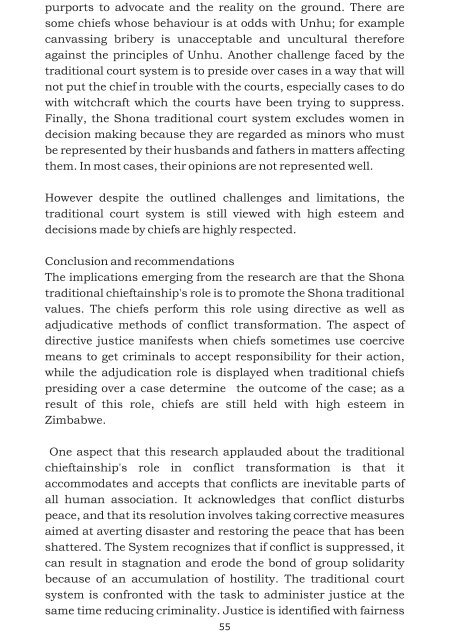Beneficiaries are actors too.pdf - Southern Institute of Peace ...
Beneficiaries are actors too.pdf - Southern Institute of Peace ...
Beneficiaries are actors too.pdf - Southern Institute of Peace ...
You also want an ePaper? Increase the reach of your titles
YUMPU automatically turns print PDFs into web optimized ePapers that Google loves.
purports to advocate and the reality on the ground. There <strong>are</strong><br />
some chiefs whose behaviour is at odds with Unhu; for example<br />
canvassing bribery is unacceptable and uncultural therefore<br />
against the principles <strong>of</strong> Unhu. Another challenge faced by the<br />
traditional court system is to preside over cases in a way that will<br />
not put the chief in trouble with the courts, especially cases to do<br />
with witchcraft which the courts have been trying to suppress.<br />
Finally, the Shona traditional court system excludes women in<br />
decision making because they <strong>are</strong> regarded as minors who must<br />
be represented by their husbands and fathers in matters affecting<br />
them. In most cases, their opinions <strong>are</strong> not represented well.<br />
However despite the outlined challenges and limitations, the<br />
traditional court system is still viewed with high esteem and<br />
decisions made by chiefs <strong>are</strong> highly respected.<br />
Conclusion and recommendations<br />
The implications emerging from the research <strong>are</strong> that the Shona<br />
traditional chieftainship's role is to promote the Shona traditional<br />
values. The chiefs perform this role using directive as well as<br />
adjudicative methods <strong>of</strong> conflict transformation. The aspect <strong>of</strong><br />
directive justice manifests when chiefs sometimes use coercive<br />
means to get criminals to accept responsibility for their action,<br />
while the adjudication role is displayed when traditional chiefs<br />
presiding over a case determine the outcome <strong>of</strong> the case; as a<br />
result <strong>of</strong> this role, chiefs <strong>are</strong> still held with high esteem in<br />
Zimbabwe.<br />
One aspect that this research applauded about the traditional<br />
chieftainship's role in conflict transformation is that it<br />
accommodates and accepts that conflicts <strong>are</strong> inevitable parts <strong>of</strong><br />
all human association. It acknowledges that conflict disturbs<br />
peace, and that its resolution involves taking corrective measures<br />
aimed at averting disaster and restoring the peace that has been<br />
shattered. The System recognizes that if conflict is suppressed, it<br />
can result in stagnation and erode the bond <strong>of</strong> group solidarity<br />
because <strong>of</strong> an accumulation <strong>of</strong> hostility. The traditional court<br />
system is confronted with the task to administer justice at the<br />
same time reducing criminality. Justice is identified with fairness<br />
55


